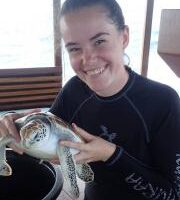Hannah Allan
PhD Candidate
The University of Queensland

From 2005 to 2022, the main node of the ARC Centre of Excellence for Coral Reef Studies was headquartered at James Cook University in Townsville, Queensland (Australia)








Hannah is a proud Boorooberongal woman of Darug Nation living and working on Turrbal and Jagera Country. She completed her undergraduate degree in Science, majoring in wildlife and marine biology, at Griffith University on the Gold Coast. She also completed her honours in the field of ecotoxicology analysing sugarcane herbicides in marine turtle nesting areas and assessing risk using in vitro toxicity assays. After her undergraduate studies, she spent over two years living and working in the Republic of Maldives as a coral biologist managing and rebuilding a coral propagation program during the aftermath of the 2016 El Niño. She was also involved in a sea turtle rehabilitation program caring for injured and ill turtles (largely olive ridleys entangled in ghost nets).
After working in the Maldives, Hannah wanted to pursue research in coral reef systems closer to home and has now undertaken a PhD supervised by Professor Peter Mumby looking into carbonate budgets on the Great Barrier Reef. Carbonate budgets indicate the net carbonate production of reefs and are an important indicator of reef “health”. Carbonate budgets can also provide insight into a reef’s ability to maintain its framework structures (associated with many ecosystem services) as well as a reef’s growth potential (especially important in the face of climate change and sea level rise).
New DNA techniques are being used to understand how coral reacted to the end of the last ice age in order to better predict how they will cope with current changes to the climate. James Cook Univer
A new study on the effects of climate change in five tropical countries has found fisheries are in more trouble than agriculture, and poor people are in the most danger. Distinguished Profess
James Cook University researchers have found brightly coloured fish are becoming increasingly rare as coral declines, with the phenomenon likely to get worse in the future. Christopher Hemingson, a
Researchers working with stakeholders in the Great Barrier Reef region have come up with ideas on how groups responsible for looking after the reef can operate more effectively when the next bleaching
Abstract: As marine species adapt to climate change, their heat tolerance will likely be under strong selection. Individual variation in heat tolerance and its heritability underpin the potential fo
Abstract: The Reef Ecology Lab in KAUST’s Red Sea Research Center explores many aspects of movement ecology of marine organisms, ranging from adult migrations to intergenerational larval dispersal
Abstract: Macroalgal meadows are a prominent, yet often maligned component of the tropical seascape. Our work at Ningaloo reef in WA demonstrate that canopy forming macroalgae provide habitat for ad
Abstract: Sharks are generally perceived as strong and fearsome animals. With fossils dating back at least 420 million years, sharks are not only majestic top predators but they also outlived dinosa
Abstract: Connectivity plays a vital role in many ecosystems through its effects on fundamental ecological and evolutionary processes. Its consequences for populations and metapopulations have been
Abstract: Evolution of many eukaryotic organisms is affected by interactions with microbes. Microbial symbioses can ultimately reflect host’s diet, habitat range, and even body shape. However, how
Abstract: The past few years have seen unprecedented coral bleaching and mortality on the Great Barrier Reef (GBR) but the consequences of this on biodiversity are not yet known. This talk will expl